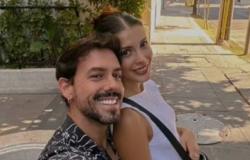(CNN Spanish) — The Asunta case, the new Netflix miniseries, is inspired by the true story of one of the most reported crimes in Spain: the murder in 2013 of Asunta Basterra, a 12-year-old Galician girl of Chinese origin, for which her parents were convicted. adoptive parents, Rosario Porto and Alfonso Basterra.
Filming began in mid-2023 in Galicia, Spain, the actual scene of the events. The Asunta Basterra crime and the subsequent police investigation are the basis of the plot of one of the Spanish series of fact-fiction Netflix’s most anticipated movies for 2024. This is the real story of the case.
Chronology of the Asunta Basterra case
The Asunta case, known as “Operation Nenúfar”, began on September 21, 2013, when the parents reported the disappearance of the minor. Asunta had been adopted by marriage in China, when she was barely a year old.
Asunta’s body was found three hours after the complaint in a forest trail in the Teo City Council, a municipality near Santiago de Compostela, media outlets such as El País and 20 Minutos reported, citing the Civil Guard. The autopsy ruled out that Asunta suffered a sexual assault, but it did confirm the indications that she had been asphyxiated, sources close to the investigation informed Europa Press at that time. Information also collected in the ruling of the case.
The Police arrested his adoptive mother as a suspect on September 24 in Santiago de Compostela following inconsistencies in her statements to the Civil Guard, according to the subsequent sentence.
A day later, the Civil Guard also arrested the adoptive father, for the alleged crime of homicide, based on “new evidence against him,” according to the newspaper El Mundo with information from Europa Press.
Both entered provisional prison in the Teixeiro prison in A Coruña on September 27.
On October 4, the results of toxicological analyzes presented by the USC Institute of Forensic Sciences revealed that Asunta had ingested high amounts of anxiolytics.
In addition, a teacher from the Asunta school testified before the judge that the girl confessed that her parents were cheating on her and that her mother, Rosario Porto, gave her “white powder” that kept her asleep for two days, as reported in the trial. later in the Sixth Section of the Provincial Court of A Coruña and was reported by media such as the newspaper El Mundo and La Voz de Galicia on October 7.
On November 19, Judge José Antonio Vázquez Taín lifted the secrecy of the Asunta case and suggested that Porto and Basterra could have planned their daughter’s death, according to court documents.
Rosario Porto, adoptive mother of Asunta Basterra, speaks to the judges during a hearing in a court in Santiago de Compostela, on September 27, 2013. (Credit: MIGUEL RIOPA/AFP via Getty Images)
During 2014, the Asunta case experienced a series of events marked by the leak of audio recordings of a conversation between Asunta’s parents in the dungeons and the first anniversary of the girl’s death.
On June 19 of that year, Judge Vázquez Taín put an end to the investigation of the case. Six days later, the Prosecutor’s Office requested 18 years in prison for the parents, accused as “responsible as co-authors” of a crime of planned murder, and pointed out the “mixed circumstance of kinship” as an aggravating factor. For its part, the popular prosecution, carried out by the Clara Campoamor association, requested 20 years for each of them, according to the information collected in the sentence.
Porto and Basterra pleaded not guilty before the judge and their lawyers requested acquittal.
The trial began on September 29, 2015 and ended a month later, on October 30, when after five days of deliberations they found Porto and Basterra guilty of the murder of your adopted daughter.
The Superior Court of Justice of Galicia ratified the sentence, dismissing the appeals filed by the defense.
Basterra remains imprisoned in the Teixeiro prison. In January he requested the third degree of confinement after spending 10 years in prison, which would mean entering an open regime in accordance with Organic Law 1/1979, of September 26 of the Spanish Penitentiary Regulations, regulations that govern classification as a prisoner. first, second and third grade. However, penitentiary institutions denied the request.
For his part, after several suicide attempts, Porto ended his life on November 18, 2020 in the Brieva prison, Ávila.
To learn how to get help for someone who may commit suicide, visit this link: cnne.com/help







